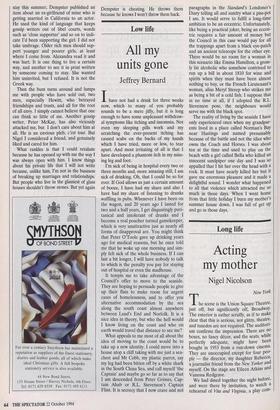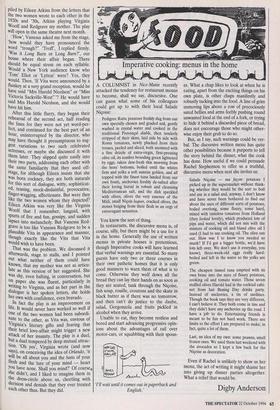Long life
Acting my mother
Nigel Nicolson
New York We had dined together the night before, and were there by invitation, to watch a rehearsal of Vita and Virginia, a play corn- piled by Eileen Atkins from the letters that the two women wrote to each other in the 1920s and '30s, Atkins playing Virginia Woolf and Redgrave my mother. The play will open in the same theatre next month.
'How', Vanessa asked me from the stage, `how would they have pronounced the word "trough?" 'Troff, I replied firmly. Was it Long Barn or Long Barn?', our house where their affair began. There should be equal stress on each syllable. Would a New York audience know who `Tom' Eliot or 'Lytton' were? Yes, they would. Then, 'If Vita were announced by a flunkey at a very grand reception, would he have said "Mrs Harold Nicolson" or "Miss Victoria Sackville-West" '? He would have said Mrs Harold Nicolson, and she would have hit him.
After this little flurry, they began their rehearsal of the second act, half reading the lines for they were not yet word-per- fect, and continued for the best part of an hour, uninterrupted by the director, who may have thought it presumptuous to sug- gest variations to two such celebrated actresses, or maybe she discussed it with them later. They slipped quite easily into their two parts, addressing each other with the same familiarity that they used off- stage, for although Eileen insists that she Was born cockney, they are both naturals for this sort of dialogue, witty, sophisticat- ed, teasing, mock-disdainful, provocative, finger-wagging, affectionate. But were they like the two women whom they depicted? Eileen Atkins was very like the Virginia Woolf that I remember, languid, with spurts of fire and fun, gossipy, and sudden lapses into melancholy. But Vanessa Red- grave is too like Vanessa Redgrave to be a plausible Vita in appearance and manner, though exactly like the Vita that Vita would wish to have been.
That was the problem. We discussed it afterwards, stage to stalls, and I pointed out what neither of them could have known, that my mother was not as articu- late as this version of her suggested. She was shy, even halting, in conversation, but on paper she was fluent, particularly in writing to Virginia, and as her part in the dialogue is her spoken letters, she holds her own with confidence, even bravado. In fact the play is an improvement on life. It would never have worked so well if One of the two women had been subordi- nate to the other, as Vita was, envious of Virginia's literary gifts and fearing that their brief love-affair might trigger a new attack of her insanity. The play is a duel, but a duel tempered by deep mutual attrac- tion. 'Oh yes', Virginia wrote (and now says), on conceiving the idea of Orlando, 'it Will be all about you and the lusts of your flesh and the lure of your mind — heart you have none. Shall you mind?' Of course, she didn't, and I liked to imagine them in the dress-circle above us, chortling with derision and denials that they ever treated each other thus. But they did.











































































 Previous page
Previous page